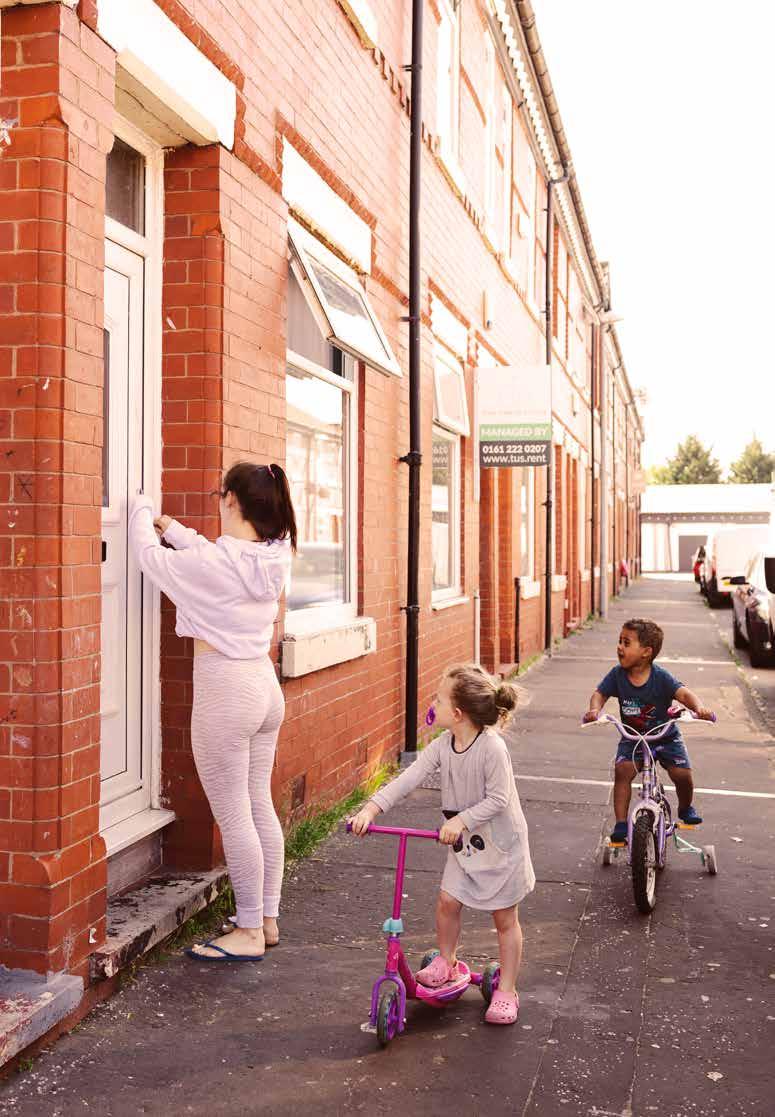
An insider’s guide to the housing system
Advice from experts on how to create a good home
Ideas to help create a home that you can be proud of


An insider’s guide to the housing system
Advice from experts on how to create a good home
Ideas to help create a home that you can be proud of


Everyone deserves a good home.
You deserve a good
home.
And we are going to help you do it. Good homes are the foundations that everyone needs for a good life. It isn’t right that so many people are in temporary accommodation, homeless, or struggling to pay their rent each month. We need to do better.
We are a group of young adults who have experienced the worst of the housing

crisis. We have been working with senior decision makers who have dedicated their careers doing what they can to mitigate the impacts of it.
We know that getting your first place is just part of the solution. Knowing how to (and being able to) create a good home is how everyone will have a good life.
It is how our children will have good lives.
We want to fill you with ideas, advice, and inspiration to make your first place a good home.
“Every page has been crafted to make things that little bit easier. We want you to know that things get better.”
This magazine is a not a solution to the housing crisis. It isn’t trying to be. And we won’t cover it up. But it has been designed by people who have been there.
Every page has been crafted to make things that little bit easier. We want you to know that things get better. And we hope that we can help with that.






Our housing system is in crisis. You might be reading this having experienced the worst of it. We’ve been there.
The housing system needs redesigning so that people can live in good homes.
It needs to be easier to understand, too. So, in this section, we focus on the housing system.
Here, you will find different tenure options (different rents or buying a home), the housing waiting list, and advice from some interviewees.
We couldn’t fit everything in. But we hope this gives you enough to get you started.

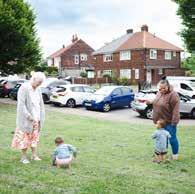


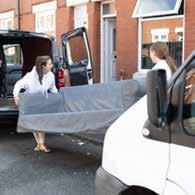
14
15
17

Social rents are linked to the incomes of local people. They provide a truly affordable and secure housing option for people.
Who provides it?
Social homes are provided by either housing associations or the local council.
It’s value
Social housing aims to be more affordable than private renting and provide more secure, long term tenancies.
How much will it cost?
Social homes are the only homes where rents are linked to local incomes. They are significantly lower than private rents.
But, there is a shortage of social homes. There aren’t even enough for people who most urgently need it.
Social homes are allocated through a housing waiting list or housing register. Try not to let the shortage put you off applying to join this list if you would like a social home. There is more information about housing waiting lists on page 13.
“Any organisation who provides social housing must be registered and are regulated.”
Any increases are limited, meaning that rents cannot go up above a maximum amount each year. This means that social homes should stay affordable for people.
Who can get social rent?
Social homes should be there for anyone who needs it.
Are social homes good quality homes?
On average, social homes are more likely to meet the standard for ‘decent’ homes.
Social homes are far from perfect – there are problems which need to be solved. Investment in maintaining and improving social homes has been patchy.
Any organisation who provides social housing must be registered and are regulated, which means that they have standards which have to be met.
*All information adapted from Shelter.

What is private rent?
Private rents are linked to the market. This means that landlords will often charge whatever people will pay. This makes private renting expensive.
Who provides it?
Privately rented homes are provided by a landlord or another party who isn’t a social housing provider.
It’s value
The main advantage of private rented homes are the amount of choice that can be available about location and type of property. But, this can vary from area to area.
How much will it cost?
Private rent is more expensive than social rent. There are limited rent controls. This means that rents can become very high in areas where there is a shortage of homes.
You might be asked to ‘bid’ for a privately rented place, where you say how much you would offer to rent. The highest bidder gets the privately rented home. This is not illegal, but it leads to higher rents for everyone so it is best to be avoided.
Who can get private rent?
Some landlords do not accept people who claim benefits.
“Privately rented homes are less regulated, meaning that there are not many controls in place to improve quality.”
To rent a home privately, you often have to pay a deposit and rent in advance.
Where there is a shortage, you might feel pressured to offer more than you can afford. It can help to figure out what you can afford, both monthly rent and upfront deposits, before looking at privately renting.
Some landlords ask for one or more references.
Private rented homes usually go quickly. Getting notifications or e-mails about new properties and following them up quickly could help. You could also get your deposit and references ready so that you can take accommodation quickly.
Are privately rented homes good quality homes?
There is a big variety in the quality of privately rented homes.
Privately rented homes are less regulated, meaning that there are not many controls in place to improve quality.
*All information adapted from Shelter.

What is home ownership?
Home ownership means when people own their house outright or they have a mortgage.
A mortgage is a type of loan from a bank or building society. They lend you money to purchase a property. Most mortgages are paid back monthly for between 25 – 35 years.
When the mortgage has finished, your own your home outright and do not make any payments.
It’s value
The main advantage of home ownership is that you own the home. You can pass the home down to your children. Or, you can sell the home and keep the money from the sale.
How much will it cost?
that you would need a deposit of at least £7,500.
Many people also pay for a survey to check if any work needs doing to improve the quality of the house.
Saving for a large deposit makes becoming a home owner very difficult for many people.
“Many people also pay for a survey to check if any work needs doing to improve the quality of the house.”
House prices vary massively both between and within areas.
To get a mortgage, as a minimum you will need a deposit, proof of regular income, and money to pay solicitors fees. A good credit score will help too.
Some banks or building societies allow you to get a mortgage with a 5% deposit. For most it is 10%. For a home worth £150,000, a 5% deposit means
Who can get a mortgage?
Most banks have free online calculators that show what they would let you borrow based on your income and your available deposit. These are intended as a guide and do not guarantee that they will lend you money.
The interest rates which banks or building societies charge you for your mortgage can go up and down. When interest rates go up, so do the monthly mortgage payments, which can make it hard to keep up with.
What is the quality of homes owned by the tenants like?
The quality of the home varies on what previous owners have done to improve it or how much you are able to afford to improve it.

What is your role?
Our first duty is to try to prevent a person or family from becoming homeless. We will look at the reasons why they are losing their home and try to find a solution so that they can stay.
This will involve looking at the reasons why they are losing their home and try and find a solution, for example, income maximisation, mediating with landlords or family members, agreeing repayment plans for arrears, so that they can stay. Sometimes this might be that they can stay for a short time while another property is found so that the family don’t have to go into temporary accommodation.
If we cannot prevent homelessness, or if someone comes to us already homeless,

then we can refer them to temporary accommodation if they have nowhere to stay and help them find somewhere else to live. This could be private or social rent. We have to complete an assessment to determine if we owe a legal duty to help people find somewhere to live.

“The most important thing is that you keep your landlord/mortgage company updated on your situation.”
We also make referrals to other places that might be able to help, for example domestic abuse services or Welfare Rights and Debt Advice.
What do you deal with most?
The three main reasons for homelessness in Salford are being asked to leave by friends and family, having a notice served by a private landlord, and domestic abuse. These are very similar to the reasons for homelessness nationally.
What helps, and makes it harder, if you are on a housing waiting list?
It helps if you can be as flexible as possie with your choice of property type and the areas you would be prepared to live in. If you need a home with more than 4 bedrooms or a home adapted for a wheelchair user, you will wait a long time as not many become available.

I’ve got rent or mortgage arrears, what should I do?
The most important thing is that you keep your landlord/mortgage company updated on your situation as they may be able to help you.
If the property is not going to be affordable to you long term, you can approach the Housing Options Service for help with finding alternative cheaper accommodation.
What advice would you give to someone who has their first home to help keep their home?
Make a budget so that you know how much everything is going to cost each week/month –rent, bills, food, travel –and stick to it.
Don’t let people into your property unless you can trust them to behave – you are responsible for the behaviour of your visitors.

If you are having any problems with neighbours or people in the vicinity, talk to your landlord.
Never leave your property without discussing issues with your landlord and giving proper notice as this could affect you being able to get another property in the future.
Where can I go for trustworthy advice about issues to do with my home?
Speak to your landlord in the first instance. If you feel that they are not helping you, you can go to Citizens Advice or Shelter; you can also go to the Housing Options Service.


“Never leave your property without discussing issues with your landlord and giving proper notice.”

Before we start, we don’t think temporary accommodation should be normalised.
Good homes are homes where you can stay.
But we know that temporary accommodation is the reality.
“It’s hard to feel proud about a place that is literally defined by the fact that you won’t be there forever.”
From those of us who have been there, we share our best pieces of advice to try to make the very best out of a very tricky situation.
Get to know people
The people around you are the only ones who will truly understand.
You won’t get on with everyone, but introducing yourself to people and socialising is the only way to find your people. You might find friends for life.
Speak up to get support
Becoming homeless is a traumatic experience. Please don’t do it alone. Whether it’s your social worker, the staff at the accommodation, or the people you’re living with – seek as much support as you can.
You don’t have to trust anyone. But, being honest about what you need and are struggling with might open up exactly the support you need. Whether you’re struggling for food, or you need to move to a different temporary place, between us we have managed to get what we need by speaking up.
Be prepared to do a lot of cleaning
It’s hard to feel proud about a place that is literally defined by the fact that you won’t be there forever. So we won’t judge when we say this, but the place will probably be a mess.
You deserve to live a nice clean place though, even if it’s not forever. Keeping any private spaces that you have clean and tidy is a start.
You will probably share spaces too, so try to be a respectful person who cleans their own mess. Also, if you don’t want to share items, don’t leave them in shared spaces.
You might be there a long time
Some of us lived in ‘temporary’ accommodation for years. We want you to know that you might be there a while.
Try to keep copies of documents
It’s easy to lose stuff when you’re not feeling settled. Taking pictures of everything as soon as you get it, then putting it on a folder on your phone means that you will have that one letter that you desperately need, whenever you need it.
Check the rules about working We think this one is really unfair.
When we said the housing system needs redesigning –getting rid of this rule is one of our first ideas.
We hope that you are reading this knowing that things have changed for the better.
Lots of temporary accommodations are funded through social care. If you earn above a certain amount, you can’t get free social care. It means that if you start earning above that certain amount, you are charged a really high amount for living in temporary accommodation.

Finding out how much that certain amount you can earn is might help you find something that doesn’t put you in difficult position.
Volunteering, or courses, or even just dreaming about what you really want can help make sure that you are ready for enjoyable work as soon as you’re out.
Stay true to who you are You might be in the place for a while, and if you’re struggling to find friends, it can be easy to do what it takes to fit in. It’s really common to lose a sense of who you are when going through any difficult experience.
Try to stay true to who you are. Keep in mind what really matters to you and do something for yourself every day.


What is it?
Homes available for social rent are allocated through a system called a Housing Waiting List or a Housing Register. These are usually managed by Councils.
How do I join?
Councils have local rules about who can join their waiting list or register. These are laid out in their ‘Allocations Policy’ which will be on their website.
You must apply to join and your application will either be refused or accepted.
Be honest on your application as your circumstances will affect your level of priority.
Who gets priority?
By law, some people get ‘reasonable preference’. This means people in these groups must get some priority for socially rented homes.
These are:
• If you are legally homeless, including if you are at risk of domestic abuse or violence.
If you do not have a bedroom for each couple, each single person aged 21 or over, each pair of children under 10, or each pair of teenagers aged 10 – 20, then you are officially overcrowded.
Very bad conditions
This means that your home needs urgent repairs or is in a very bad condition. Or, it is unsanitary, for example has sewage problems. Or, lacks basic washing and cooking facilities.
Need to move for health or welfare reasons
If you or someone in your house needs sheltered housing if they are older, supported housing because of a disability, or adapted housing because of physical disability.
How do they choose who gets a social home?
“Be honest on your application as your circumstances will affect your level of priority.”
• If you are officially overcrowded or living in very bad conditions.
• Need to move for health or welfare reasons
Your council’s Allocations Policy will have information about any further system and criteria that they use to give priority.
Most councils use a measure called the bedroom standard to calculate this. Check their Allocations Policy as some use another measure.
Each area will either run what is called a ‘choice based letting scheme’, where you express an interest in homes.
Or, what is called ‘direct offers’, where a property is identified for you. The applicant with highest priority will be offered the home.
It is risky to turn down an offer of a council or housing association home. Some councils remove or suspend people who refuse an offer or reduce their priority.
How long will I wait?
This depends on your priority band or points.
There is a shortage of social homes in most areas. You could be waiting for a home for months or sometimes years even if you’re in a priority group.

Your first home will certainly be a learning experience. We found out what surprised others about their first home, so you can be ready for yours.
Unless you have a prepayment meter or you are on a fixed deal, then you are expected to give your energy providers your meter readings.
If you don’t, your provider will guess your usage and charge you based on that. Knowing what you use helps you keep on top of things and telling your provider helps you avoid debt. Get a good deal, then get another You can find the best deals for bills on websites such as Money Saving Expert.
Often, those great prices are for a fixed time only, then the price will massively increase. Pop a reminder in your phone for a month before the deal ends to find a new deal.
Going through what you already spend is never fun, but it can help you refocus your priorities.
‘When I looked at my spending and set a budget, I switched taxis for a bus pass, and we enjoy a chippy twice a month guilt free. Money is stressful so it is scary, but being in control does a lot for your mental health.’
When buying any type of insurance, the ‘excess’ is what you pay if you ever need to claim.
“Going through what you already spend is never fun, but it can help you refocus your priorities.”
From the cost of council tax to the price of cheese, anything you haven’t paid before can take you by surprise.
It can be tempting to choose a lower excess to reduce the monthly cost of the insurance product.
But, if you need to claim, then you will have to pay the excess. You should consider paying a little more for an excess that you can definitely afford if you ever need to claim.
What help do Housing Officers provide?
Housing Officers work in Local Councils or Housing Associations. The role of the Housing Officer is to provide support to people to make sure they have a successful tenancy.
This starts from the very beginning, even before people are signing up to their new tenancy and getting their keys.
We will figure out the level of support you need and will agree with you about how this will be provided. This can include advising on benefits, sourcing furniture and setting up bills.
We spoke to a Housing Officer from ForHousing to get their perspective on all things good homes. “Having good relationships with neighbours can be helpful as neighbours can look out for each other.”
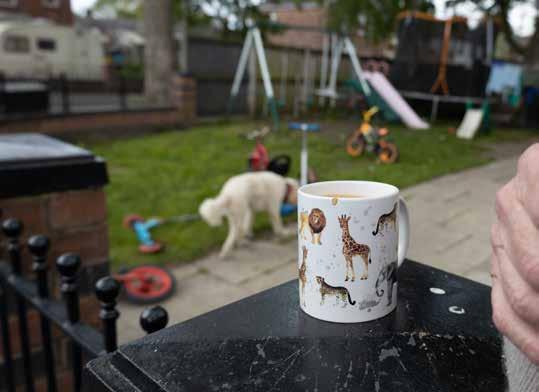
What issues do you deal with the most in your role, and how can we avoid them? At times, we need to deal with people breaching the terms of their tenancy agreement. Some examples include causing anti-social behaviour, not paying rent, not looking after the home. Our role is to help support people to put things right. This means we will give advice on how to improve the situation and to avoid losing the home.

Throughout the tenancy, we continue to provide support, guidance and advice. For example, if you are experiencing antisocial behaviour or need advice on who to contact about different issues.
To avoid risking your tenancy, you just need to contact your Housing Association and work with them, no-one wants anyone to lose their home.
What issues are easily dealt with, that my landlord or I can sort quickly?
There are lots of different issues that are dealt with very easily. For example, repairs to the home, rent issues such as being unable to make a payment or a change in circumstances.
Sometimes, you just need to know who to contact, and often we know the answer so please ask your Housing Association.

What can I do, as a tenant, to keep my house safe?
Your home should be safe and secure for the start of your tenancy. You must then make sure it remains safe and secure during the tenancy.
Some practical solutions would be to ensure windows are closed when there is no-one home, that doors are locked and there are no expensive items on show.
Having good relationships with neighbours can be helpful as neighbours can look out for each other and help keep the homes safe.
It is also importent to ensure that any checks that the landlord needs to carry out such as gas or electrical safety checks are done.
You should report any potential issues that may negatively impact on the safety and security of you home to your landlord as soon as you become aware of them.
I need a repair to my house. What should I do? If you need a repair, you just need to contact your landlord – there are usually different ways to do this which might include calling a service centre, logging on the website or through an app.
The landlord will book an appointment at a time that is convenient to you and the repair will be carried out.
There are time frames for different types of repairs, these are also usually found on the landlord’s website.
There are some repairs that are the responsibility of the tenant, these are usually listed on the landlord’s website.
If your landlord ignores your request for a repair, you can make a complaint.
You can find out how on your landlord’s website. If you follow the complaints procedure but you are still dissatisfied, you can contact the Housing Ombudsman or your local Councillor or MP.
How does someone get a job within Housing? Housing Associations advertise their vacant posts on their website. They clearly state the full requirements of the role. There are many different types of roles within a Housing Association.

“There are time frames for different types of repairs, these are also usually found on the landlord’s website.”


‘By sticking together, we tend to win’
We spoke to Phil, the treasurer of ACORN Manchester, about rights for private renters.
How do ACORN help people who are privately renting their home?
The fundamental problem you face as a private rented tenant is the amount of power landlords have over you. That’s real, economic power.
At ACORN, we aim to foster our own power. A real power. And that’s strength in numbers. That’s people power. When used properly, we can be as strong as any other power including economic power.
We bring people together who are facing similar situations from ridiculous rent increases to the possibility of being evicted.
We band together, we take our power, and we make changes that help renters and ordinary people.
Does it work?
By sticking together, we tend to win. We stop evictions all the time.
A private landlord threated one of our members with a completely illegal
eviction. We had 60 members turn up on a cold December day. We sent the landlord packing. We prevented Peter from being made homeless.
Another private landlord put up a member’s rent by £300. They couldn’t afford it, meaning she would become homeless. We organised phone campaigns of the letting agent. Whenever they answered the phone, it was us telling them what an awful situation they put our member in. In the end, we secured a £50 a month increase for 3 months. It gave her enough time to find somewhere else.
Is there anything else that we should know about ACORN?
We are a union for the community, not just for renters. We build power around all sorts of issues that people face in their community.
Get involved, organise people in your community, and build an alternative power base in your community.

Before you move
Have a clear out of anything that you definitely don’t want to bring into your new home
If you’re moving from one home to another, check that you are paid up on your rent and bills in your current home then close your accounts
Create a rough budget
Try to find people who can help you on the day of your move
Make sure to pack a separate bag of essentials such as loo roll, a mug, bedding, and toiletries so you are not rummaging through to find toothpaste.
Moving day
Give your new place a quick clean – there is no better time to do it
Check through your tenancy agreement to find out what you are responsible for and what your landlord is responsible for
Put your spare keys somewhere safe
Check and submit meter readings so you are not charged for power used by the previous tenant
Knock on and introduce yourself to any neighbours.
When you’re in (but soon after you move)
Find out your bin day
Use Money Saving Expert to find deals for your bills: gas and electric, phone and broadband, TV licence, contents insurance
With this information, update your budget
Set up your council tax
Register to vote – it helps your credit score and gives you proof of address
If you need to, register with a new Doctors and a new Dentist
Inform your work, bank, DVLA, and HM Revenue and Customs that you have moved
Change your address with any places your order online from so you don’t accidentally order to the wrong address
Change your address with any subscription services such as Netflix or Spotify
Write a list of the items you need and start looking for bargains or freebies
Deal with post that comes for the old tenant: write ‘return to sender, addressee moved’ on the envelop and pop back in the postbox. You don’t need to pay for a stamp!

Home isn’t just the walls that you live in. A street, an estate, even a whole town can feel like home.
You might not like your new area at first. Settling somewhere new takes time and effort. But that ‘I belong here’ feeling runs deep. It can make all parts of life better. The time and effort is so worth it.
So, in this section, we focus on community.
We share inside information about community spaces, ideas from people who have been there, as well as how small businesses help bring communities to life.





At the heart of many communities are leisure centres.
The purpose of Salford Community Leisure is ‘enhancing people’s lives’. They work hard to ensure every experience is the very best that it can be.
Leisure centres mean different things to everyone. For some it’s a place to spend time with friends, for some it’s doing something for themselves, for some it’s a place to improve their health and their confidence. For others, it’s all of the above.
We spoke to Richard from Worsley Leisure Centre to find out more.

What do leisure centres offer?
So much. From swimming, to the gym, to group exercise classes, to swimming lessons, to aqua natal.
Some leisure centres have a sauna and a steam room. Some have coffee shops – perfect for a post activity drink with friends.
With membership of Salford Community Leisure, you get access to every leisure centre. If your local one doesn’t have a particular facility, you will be welcomed at any other.
What is it like working at a leisure centre and what do you look for in staff?
Bit of a cliché answer this one, but every single day is different.
We work very hard to make sure our leisure centres are clean and presentable to the community. We take care of gym inductions, set up and clear away activities. Gymnastics in particular can be very equipment heavy in terms of set up.
Leisure centres are fast paced buildings with lots going on with a lot of people around – being able to think for yourself, working as part of a team and good communication are the attributes we would look for first.


Did you know that the first unconditionally free public lending library was in Salford?
We spoke to Karen from Walkden Library who told us that libraries are bright, warm, welcoming, and safe spaces for everyone.
‘Libraries offer so much’
We have free to borrow books in many genres such as fiction, recipe books, travel guides. At Walkden library we have a section dedicated to the TikTok reading chart. In Salford, we don’t have late fees for our books. We are fine free.
We provide free access computers too and we subscribe to services that you can access for free through either our library computers or your library login. These subscriptions include ancestry.com where you can research your family history, Theory Test Pro to practice your driving theory, some business databases, and more.
If you download the BorrowBox on your personal device, then you can you use your library login to access magazines, newspapers, e-books, and e-audiobooks. All for free!
We offer printing and photocopying for a small charge. We facilitate digital help sessions. We also have free Wi-FI access and charging points.


At Walkden Library, we always have a jigsaw on the go. People from all different ages and backgrounds will stop and do a bit. We also have board games.
It’s not just children’s books, we have story time and stay and play sessions. At Walkden, we have toys, iPads with games on them, and colouring sheets.
Anyone can become a member of the library, it’s free and ID isn’t required.
I really enjoy helping, supporting, and engaging with people from the local area.
Library staff are friendly, approachable, and helpful.
Being in and around green space came up time and time again when we asked people what it means to live in a good home.
‘When life is hard and your head is mashed, you just need to go outside’ says one of our local interviewees.
Another told us that they have been bedridden for five years, and said ‘take it from me, just go outside, be refreshed, and feel alive’.
Finding somewhere green, maybe with water, for some quiet and calm might be just what you need when life gets too much.
What are green and blue spaces?
Green spaces might be parks, woodlands, fields, or even allotments.
Blue space just means near water. That could be the sea, coastlines, rivers, lakes, canals, waterfalls, or fountains.




Where to find them
The websites of your local council and other nearby council areas might have some listed. You could even just look at a map. Brown road signs highlight attractions and facilities so they might point you in the right direction.
Many green and blue spaces have lots of different entrances, so keep that in mind when finding places that you can walk or get the bus too.
Asking people when you are out and about can help you find hidden gems. Dog walkers usually know a good spot.
How to make them even better
Doing a litter pick can transform any area. Local councils often provide litter pickers and bags for free.
Remember to always look after your community and leave spaces as you found them, clearing up all your litter.
Friends’ groups are groups of people who look after a particular space or facility and make it better – you could join or set one up.

A play park can provide hours of fun and help your little ones blow off some steam.
Finding a good play park that isn’t too much hassle to get to is a key step to settling your children into a new place.
If there isn’t one close enough, if it needs upgrading, or if the route there isn’t safe, you could get together with your neighbours and local councillors and start a campaign. If you don’t ask, you don’t get!





Salford Community Leisure’s Active Communities team offer a wide range of activities across Salford to support children’s mental and physical well-being. They have some great ideas for how to get your children involved in the local community.
How can I help my child find a hobby?
There’s something for everyone in Salford. MyCityDirectory is a great resource and includes what’s available for children and young people with special educational needs and/or disabilities. You can also look at the Salford Community Leisure website under ‘What’s On’.
What can I do if my child hates sports? Some young people have had negative experiences of physical activity. But there are still lots of ways they can stay fit and healthy, and get moving with fun games and activities.
In the school holidays, we give children opportunities to learn new things, like circus skills and rock climbing. We also support them to understand why it’s important to eat healthily and move their bodies.
Where can I find affordable options?
Most of the sport, physical activity, arts, and cultural events we provide in Salford are free or low cost to make them accessible to everyone.
How can I help my child create positive memories of sports?

Lots of our team members used to attend our sessions. They enjoyed them so much they wanted to offer the same positive experiences to children today. They help them develop their skills, make new friends, and challenge themselves to try something new.
How can I get a job working with communities and children?
Volunteering is a great way to begin. It gives you the experience of what the role would be like and the chance to have a positive impact on the lives of young people in the local area.

Getting your own place can feel lonely at times, even if you live with other people.
Being connected to people other than those who you live with, people you care about, people that help make you happy, can make such a difference.
Catching up with a mate doesn’t have to cost the earth. In fact, it doesn’t have to cost at all.
Free or almost free
‘Go for a walk. A long walk with laughs, moans, and gossip. It’s just the best stress reliever’
‘Chilling at home with your mate watching something. Sometimes it’s just what you need’
‘Honestly? A brew and a cry with your mate on the sofa. Nothing beats it.’
‘Sometimes me and my friend get all our stuff done together. We go chemist, send any post, just anything we are putting off really. We get stuff done and have a laugh’
‘Phone call or faceime. Nothing beats hearing someone’s voice. We can chat and laugh for hours’
Low cost
‘Chippy on a bench isn’t too expensive’
‘Cooking at home. Sharing food and chatting is my favourite thing to do’
‘Good food and good conversations. It’s all you need’
‘One drink in a café is a change of scenery for not too much money’
‘Looking round like B&M or a garden centre and planning our future lives. We try not to spend too much’


A little bit extra
‘Going gym with a friend can be really motivating’
‘Chill and a drink at my friend’s allotment’
‘Watching sport together. Women’s football can be really affordable even at the top levels and I’d say it’s better. None of that diving!’




Small businesses make a community feel like home. Here’s a short selection of some of our favourite places to eat, shop and visit in Salford.
Shops
Every area has its own selection of independent shops. For example, in Walkden there’s Clouds – a family-run gift shop – and, in Irlam, a DIY store full of friendly staff who can help you find the things you need for your home.
Most areas have a Timpson, which has lots of helpful services and support for people getting back into work after time in prison. And, of course, your local corner shop is a familiar place that’s always there when you run out of something.
Cuisine
Thanks to the brilliant diversity across the UK, we have many different cultures with great food to sample. Try your local Polish shops for some delicious doughnuts or have a meal in an Italian restaurant.
In Salford, you’ll find Bengali street food and Indian options, like Mrs A’s Kitchen in Eccles. Or, you can try Nigerian jollof rice at Yetti’s Kitchen. Greek food, like gyros and orange cake, is really popular, and stop by Brackmans Bakery to try a Kosher bagel.
Cafés
You’ll always feel comforted by a local café – most of us have our favourites in our neighbourhood. And you can’t go wrong with some tasty fish and chips or a coffee and cake after a walk in the park.
Lots of areas have charity and community cafés, too. In Salford, we have The Tatton, Ordsall, which runs lots of schemes to help the elderly and vulnerable, and Da Vida Deli, Swinton, which gives its profits to survivors of domestic abuse – to name but a few.
Pop by your local shop or café to support an independent business with friendly service and a welcoming atmosphere.

Moving home is considered one of the most stressful life events. You might think everyone else feels excited and super happy in their first place. Actually, it is normal to feel exhausted, burnt out, and disappointed.
Understand where you are at Moving home is stressful even if it is happening for good and exciting reasons. Moving home when you are going through something difficult just adds to that stress. You are bound to feel overwhelmed and a bit down. But it does get better.
Be patient
You’re going to need some time to figure the area out and find where you fit. The first things that you notice will be all the things that are different to wherever you feel that home is, so give yourself time to get all those negative feelings out.
Figure out what you need
Once you have given yourself time to feel all those difficult feelings, start to figure out what you need from a community. It might be a gym, a nice walk, a barber’s, a coffee shop, a takeaway. Whatever it is, once you have figured it out, enjoy trying new places until you find your favourite.
Get to know your new community
You don’t even have to leave your place to do this – Facebook or just looking at a map on your phone are great starts. Going on a walk just to look around will help you find your bearings. Talking to people from staff in local shops to dog walkers to hairdressers and beauty therapists will help you find hidden gems. The next two pages will give you a helping hand too.
Stay connected
Moving away from somewhere that you know can make you feel lonely. Making the time to keep in touch with the people you care about is especially important.


Place to get food
Favourite takeaway
Place for a hot or cold drink
Gym or swimming pool (or both)
Library
Place you can see lots of green and nature
Somewhere peaceful
Somewhere you can see water
A calm route for a 30 minute walk
Somewhere you can get household DIY bits
Somewhere you would go to celebrate good news
Somewhere that you can watch the sunset
Somewhere with a really good view
Somewhere that you can be with trees and nature
Recycling Centre
Writing all this down is a bit old school. Feel free to find the correct numbers and save them in your phone so that you always have them on hand. You may never use some of these numbers, but having them on hand if you do need them will make any emergencies feel easier to deal with.


It’s not always what you know, it’s who you know. And, what they can tell you. We have featured some advice from experts already. But we’ve not yet covered it all.
So, in this section, we focus on experts. Here, we speak to people who have valuable knowledge to share about making a good home.
You will find information about increasing your income. You will find advice from tradespeople and emergency services about making your home safe and long lasting. You will even find information about making your home happy and green.

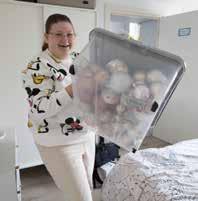



Your landlord should make sure that your home is safe and free from any hazards.
You also have responsibility regarding repairs and conditions in your home. You must use your home in a tenant like manner. This means:
• Keeping your home reasonably clean
• Safety checks on electrical appliances that you own
• Keeping gardens or outside areas in a reasonable state
• Making sure that your home is well ventilated to help avoid condensation
• Minor maintenance such as changing light bulbs or smoke alarm batteries
You only need to maintain your home to a reasonable level. You do not have to leave it in a better condition than when you moved in.
*All advice adapted from Shelter.
Toilet is blocked (won’t flush)
Call 999.
In an emergency Call the National Gas Emergency Helpline on 0800 111 999. I can smell gas
I have a water leak
Find your stop tap and turn off your water supply. All water companies will have a video or step by step explanation. Then, it is probably your landlord’s job to maintain to report it to them.
My landlord is ignoring my request
Read advice online about dealing with your landlord from Citizens Advice or Shelter. Keeping copies of all communication is important as it will help you prove that you have reported issues to them.
Find your stop tap and turn off your water supply. Use a plunger to see if that resolves the issue. See if you can borrow one from a neighbour if you don’t have one. If it doesn’t work, report to your landlord.
We have mice, bed bugs, bees or any other pest
Your local council will probably have advice on their website about dealing with each type of pest. Start there. You should inform your landlord – it might be their responsibility to resolve.
Damp is dangerous. It needs resolving as soon as possible.
It is not always easy to figure out who is responsible for dealing with damp because it can be hard to find the source.
Report any damp to your landlord, and check that you are following advice about preventing damp.
You will probably need a new bulb. Have a look online for a step by step guide on replacing a bulb. It’s easy enough.
If it still isn’t working, try putting a bulb that is working elsewhere in the same place. If another bulb works, the problem is the light bulb. If a bulb that works somewhere else doesn’t work where you have tried, then you should report it to your landlord as there may be an electrical issue.
Make sure to keep that light turned off.
Power cut
Get in touch with your electricity network operator. There is one for every region in the UK.
They will have a page on their website where you can enter your postcode and check if they know about the power cut. Information about repairs will come up there. If nothing is coming up, report it to them.

Getting back into work or finding a new job can feel like a challenge. But help is available. Mat and Dave, from the Skills and Work Team at Salford City Council, tell us how they support people to find the right roles.
Where can I get help to find a job?
Search online or get in touch with your local council. There are so many different websites that list job vacancies so try a few. You might even want to look directly at the websites of employers in your area.
Here, we run Salford Employ – a free service that helps Salford residents find jobs in the local area. The service will help you with your CV and application, and someone will talk to you about the kinds of jobs that could be right for you.
What kinds of jobs are available?
A careers advisor can tell you what sort of career might best fit your experience and needs. They’ll also have access to a list of what jobs are available in Salford and across Greater Manchester. Admin, customer service and care staff jobs are always in high demand.
What if I don’t have many qualifications?
That’s OK – there are plenty of opportunities both to work and do training. A
careers advisor will help you see where you have skills and build your confidence for applications and interviews. They can also support you to find a job that suits you if you’re worried about finding childcare or losing your benefits.
How can I become a careers advisor?
You can get a degree, do an apprenticeship, or get a job as a careers support assistant or youth worker. All these options would be a brilliant way to learn the skills you need to get a careers advisor qualification.
“There are so many different websites that list job vacancies so try a few.”


It is important you understand your welfare rights
and know
where to get help with benefits. Catherine Connors is the Service Manager at Salford Welfare Rights and Debt Advice Service ran by Salford City Council. She tells us how and where you can access support.
How can welfare rights advisors help me?
We can help anyone who lives in Salford. Our advice is confidential. We are here to make sure you know and understand your rights so you get the welfare benefits and other financial support you need. This includes working out if you can claim benefits and how this might change in the future (for example, if you got a job).
We can also make sure you get fair treatment and help you appeal if an organisation stops or reduces your benefits.
What does a debt advisor do?
Our debt advisors deal with lots of different kinds of debt. They can help you put financial statements together and support you at court if you have a problem with your mortgage or social housing rent.
“The system is very complicated, which can make it tricky to complete an application form.”
They also look at ways to put debt payments on hold if you can’t afford to pay anything.
What welfare and debt problems can you help me with?
We support people in every type of situation. You might be looking for work, not able to work due to health issues, caring for young children or someone with a disability, or in education or training.
The system is very complicated, which can make it tricky to complete an application online. We help you get



the documents you need, make sure you provide the right information, and challenge any decisions that aren’t fair.
How do I know if I can get any benefits?
A lot of people tell us they haven’t asked for help before because they didn’t think they could claim any benefits. This might be because they have a job, have some savings, or are unpaid carers.
We can do a full benefit check for you. Not only will this show you what you can get, it will also show you how claiming one benefit can affect your rights to another payment.
What should I do if I’ve been ignoring my debt?
Don’t worry – you’re not alone. It’s really common to wait a long time to get help when you’re worried. You should seek help as soon as possible. But it’s never too late to come to us for help – evictions can be stopped on the day of the hearing. Dealing with debts rather than not paying them may actually improve your credit score in the long term.
Where can I get advice about benefits and debt?
Asking for the right information is always a positive step. In Salford, there are lots of ways we can help you if you’re cutting back on food shopping to pay bills or struggling to pay your rent.
It’s important to get advice from trained advisors. That’s because we’re up to date with the latest laws and don’t charge a fee. In Salford, the Council’s Welfare Rights and Debt Advice Service offers advice on both benefits and debt. Other local advice providers include Citizens Advice and MIND. You can also look online at the National Debt Line and the government benefits calculators.
We’re here to help you stand up for yourself, get the support you need, and increase your confidence and well-being.
“We’re here to help you stand up for yourself, get the support you need, and increase your confidence and well-being.”



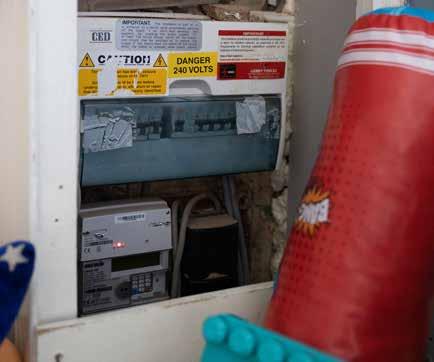
Faulty electrics are a common cause of fires in homes. But there are things
that you can do to
reduce the risk. We have shared some ideas below. Your local fire service will have lots of information on their website.
Get in a professional
You should always get a professional in to do electrical work. It is also worth checking if your landlord is responsible for this.
There are two things you can learn yourself
Spoiler alert! Our handyperson on page 44 suggests that changing light bulbs and replacing fuses are useful things to learn to save you time and money. Always check you are replacing with a new fuse and bulb of the same rating.
Taking care of your appliances
Check out page 46 to find out how to register for safety updates on your appliances. You should get a repair or replacement if any of your products are recalled. Go to the place you bought it if you have a receipt. If not, go to the manufacturer.
What to look out for
Hot plugs, sockets, scorch marks, fuses that often blow, or flickering lights are all signs of loose wiring or other electrical problems. These will need attention immediately so report them to your landlord or get a professional in.
“Make sure high powered applinaces, like washing machines, should have a single plug to themselves.”
All your electrical appliances should have a British or European safety mark on them.
Keep your receipts to make replacements or repairs easier.
Check and replace any old cables and leads. Especially ones hidden from view – behind furniture or under carpets.
Badly wired plugs that have lose wires will need replacing.
Use sockets safely
Use only one adaptor per socket – don’t plug one into the other. Make sure high powered appliances, like washing machines, should have a single plug to themselves.
*For more details, visit the Greater Manchester Fire & Rescue Service website.
Ryan has been a heating engineer for 20 years. He worked for British Gas before setting up his own business, Newsham Heating, which has a great reputation. He tells us how to make sure your heating system is working properly.
What does a heating engineer do?
I service central heating systems. That includes installing new boilers, radiators, gas fires, and gas cookers. I also fix these things if they break down.
What’s the difference between a heating engineer and a plumber?
It’s confusing, but a heating engineer works with gas. We need to have a valid Gas Safe qualification and complete a test to renew it every five years.
What should I invest in?
Buy a decent boiler and you should save money long term. Cheap boilers often have short guarantees and their parts are usually more expensive. A good boiler is also more efficient, which should reduce your heating bills.

I save money?
Get your appliances serviced regularly so you know they’re working properly. Between services, you can also do a few things yourself. For example, follow instructions to bleed radiators and top up your boiler pressure.
How do I know if I can trust a tradesperson?
CCheck out their business page on social media, look at pictures of their work, and read customer reviews. You can also ask friends and family for recommendations.
“Remember: a heating engineer should have a gas safe card. Ask to see this and check it’s in date.”

Remember: a heating engineer should have a Gas Safe card. Ask to see this and check it’s in date.
How can I become a heating engineer?
An apprenticeship gives you hands-on experience of the job and gives you the right qualifications. If you want to set up your own business, do lots of research. You’ll need to think about things like getting an accountant and what kinds of customers you’ll work for.
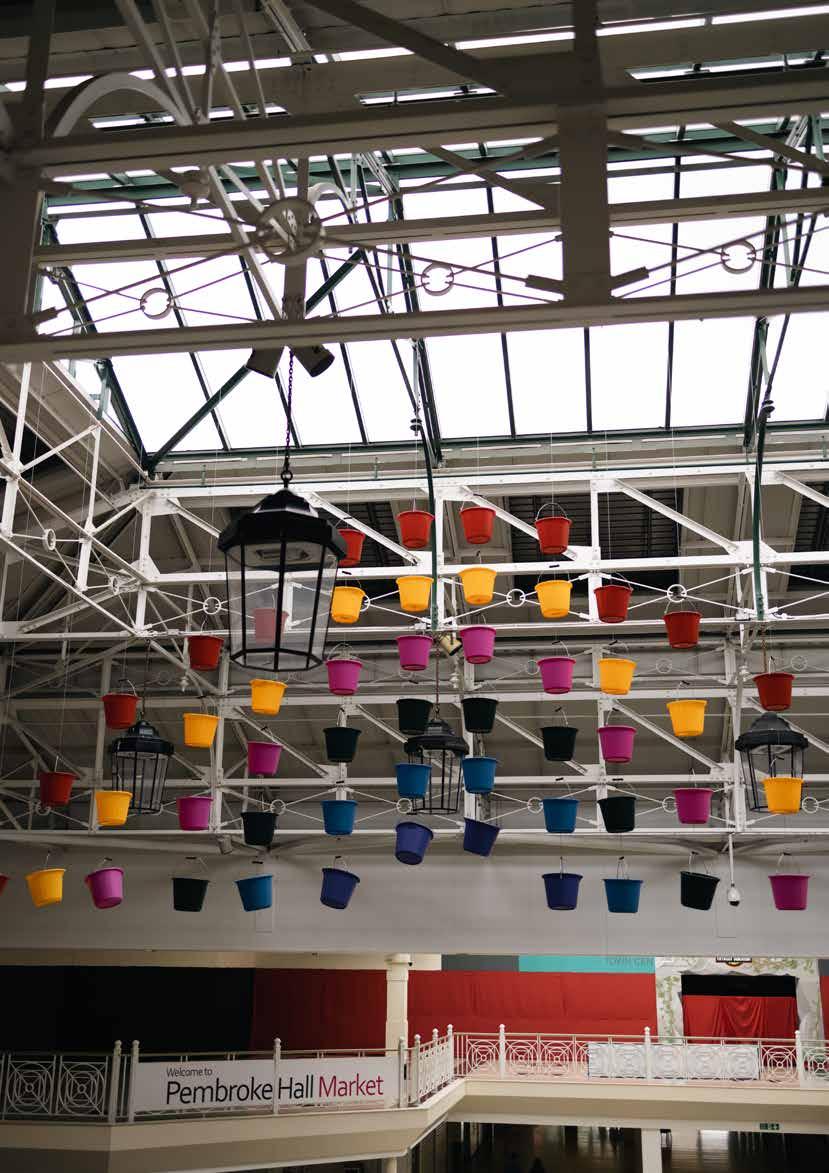

Most social landlords will not provide flooring for your place. Getting the flooring sorted can really make your place feel like home. But it can be expensive. Here are some ideas for keeping the cost down. You might also want to look for grants to support the cost.
If you already have flooring in place, there are some easy hacks that save you buying new.
Wooden and laminate floors can be painted to give them a refresh. You might also want to look at flooring stickers which are available in lots of different styles.
Free is always the most cost effective option
When people get flooring done, they will often be left with spare pieces that they just need to get rid of. Popping a post on a Facebook group might help find you just what you need.
Fitting can be expensive. But there are some options that you can do yourself. Lots of laminate floors are easy to install as they just slide together.
Carpet tiles are an option for reducing the cost of carpet.
“Carpet tiles are an option for reducing the cost of carpet.”
Make sure that you know your measurements though, as you don’t want to end up with something that just doesn’t fit.
Local flooring supply stores or fitters might have larger pieces that are going spare at a reduce cost. Keep an eye out!
For all these ideas, taking the time to fit them properly will make all the difference.
Carpets – it’s about the underlay
Carpet underlay is a material placed under carpets. It is comfy, it helps your carpet last longer, and reduces noise.
By budgeting and saving for underlay, you can choose a cheaper carpet and keep your carpet from needing replacement - which will save money in the long term.
This experienced decorator wanted to remain anonymous. He has given his best advice for making painting look great.
What tools should I use?
Don’t buy cheap brushes. Look for length of bristles and plenty of volume. A brush is only used to transfer the paint from the pot to the surface. More bristles means less dipping in. Clean your brushes afterwards and they will last a long time.
Similarly with rollers, a medium pile roller will be good enough for most walls and ceilings - unless it is a very rough surface such as Artex.
It is always better to tip some paint from the can into either a smaller
pot or if using rollers, a tray or scuttle. This will avoid spillages.
Personally, I always have a bucket of water and a sponge handy when using water based paints or decorating wipes with oil based paint.
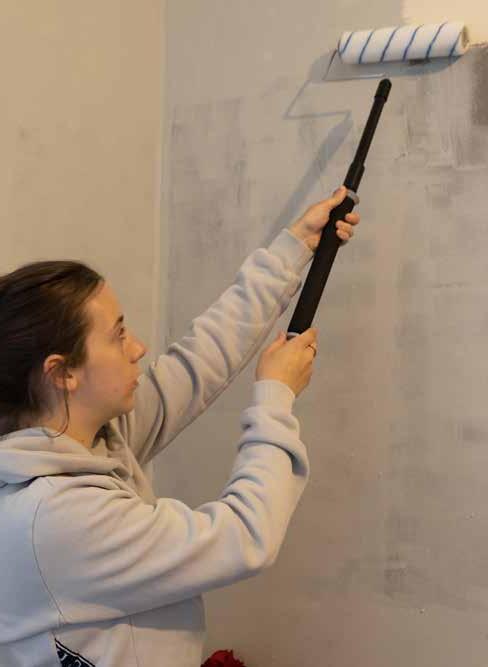
How do I use decorating tools properly?
When using a brush try to remember that the bristles are not actually doing the painting - they should be pushing the paint along. This thought will also help when cutting in (painting a straight line) to a different colour.
The final stroke (we call that laying off) should either be in an upward direction on flat surfaces and with very little pressure.
With rollers avoid the temptation to put pressure on to get better coverage as this will push paint out at the edges and leave what looks like tram lines. Lighter strokes with a well loaded roller will give better coverage.
Any final tips?
It is best to avoid painting with electric lighting as this might give problems with shadows. Using natural light from windows should be enough.
As with any good job. Preparation is key.

Helping Hands is a not for profit organisation that was set up 25 years ago by residents of The Valley estate in Swinton. They wanted to help each other out by carrying out minor repairs to keep people safe and well in their homes.
Helping Hands are now funded by the Council to provide services free of charge for people who need it most and offer low cost work for people who do not qualify.
They tell us all about how to keep your home in good repair.
What are some easy things to learn so you can do repairs yourself?
Start with learning how to top up prepayment meters if you have them. Then, get to know energy saving measures. Another key one is learning to paint and decorate because you will see a big difference.
For repairs: how to replace fuses, how to top up your boiler, how to replace a small pane of glass, how to lubricate and maintain your door locks and hinges.

Other jobs to know: how to use a drill correctly, how to measure correctly, how to put up batons for curtains, and how to fit blinds.
YouTube is a great for learning these skills.
Are there any jobs which you would advise always getting a professional in?
Anything electrical except replacing light bulbs which you can do yourself. Anything to do with gas, boiler, fires, cookers, or heaters.
“It is worth checking if your landlord is responsible for jobs before doing them. ”

Always get a plumber for replacing taps, toilets, baths, swinks, etc.
Major repair work, pointing, replastering, and replacing of doors and windows should always be done professionally.
It is worth checking if your landlord is responsible for jobs before doing them.
What do you enjoy about your role? It is a satisfying job, especially getting positive feedback and people coming back to us. We are a great team and we get good training. Everyone feels valued.
It’s important to make sure your home is a safe place. A burglary and robbery sergeant at Greater Manchester Police shares some of the main ways you can reduce your risk of becoming a victim of theft.
What can I do to protect my home?
You might be surprised to learn that a lot of people leave their keys in the front door. It’s an easy way for burglars to get access to your home or your car (if you have one).
Putting an anti-snap lock on your door is a really good idea. It makes it very difficult for someone to break into your home
How can I keep my home safe on a budget?
There are lots of ways to put off burglars. Some of these are cheap to install, such as adding a padlock to your shed or using an anti-snap lock. You can also think about CCTV, security lighting, and fitting a burglar alarm.

How do I stay safe when out and about?
Lock your phone with a PIN, pattern, or password so thieves can’t access your information. And turn off message previews so when your phone is locked no one can see any messages about reset or login codes.
If someone threatens you with a weapon, hand over your belongings. It’s not a nice feeling, but it helps you stay safe. Then, call the police.
“Lock your phone with a PIN, pattern, or password so thieves can’t access your information.”
I live in a ground floor flat. What should I do to avoid a burglary?
It’s really important to keep your door locked at all times. Lock your windows, too, when you leave the house or go to sleep at night.
How can I help others feel safe?
Keep your distance when walking behind someone, avoid staring at strangers, and call out your friends if they’re acting inappropriately.
Here you find helpful advice from the Greater Manchester Fire and Rescue Service website. This isn’t everything, so use the QR code to find out more. You can also do a home fire safety check online for free.
How can I protect my home and family from fire?
Smoke alarms are cheap and easy to install. Fit one on every level of your home. Getting a 10 year battery smoke alarm will cost more upfront, but save you on replacing batteries. Test them regularly.
Ensure you have a gas safety check each year for your boiler or appliances.
Register your electrical appliances at www.registermyapplicance.org.uk to get safety updates.
Cigarettes:
Smoking is the main cause of fire deaths in the home. Quitting or having a smoke-free home are the best ways to prevent a smoking related fire.
Candles:
Scan Me
Your landlord must ensure at least one smoke alarm is provided on every storey of your home and ensure alarms are repaired or replaced once informed that they are faulty. They should also arrange an annual gas safety check for any fixed appliances.
If your landlord is failing to provide this, report them to your local council.
How can I prevent fires?
Kitchen:
Loose clothing, tea towels, and cloths can easily catch fire. Keep them away from hobs. Double check your cooker is off when you’ve finished cooking. Don’t put anything metal in the microwave.
Electricals:
Don’t overload your extension leads. Keep the oven, hob, and grill clean because a build-up of fat and grease can ignite a fire.
Be very careful with candles. Keep them away from pets, children, and materials like curtains that may catch fire.
Never bypass electric and gas meters
The potential dangers of meter tampering include sparks, fires, damage to property, explosions and even deaths.



We spoke to Tom Togher from Citizens Advice Salford about the support that they offer.
What can you help with?
Advice with pretty much anything. I think people don’t always know just how much we can help with.
We’re probably the best place to start with, and if we can’t help, we will find somebody else who can.
All our services are free and confidential.
We have lots of information on our website. You can come to see us in person, e-mail, or phone us.
What can you help with?
It can be really difficult setting up a new home for the first time – we can help give you advice about what you might need to do, and we can direct you to local sources of help with the cost for urgent issues.
What do you enjoy about your job and how might I do something similar? No day is ever the same. There is a great feeling when you can help people fix a problem that’s been worrying them and causing stress.
“No day is ever the same. There is a great feeling when you can help people fix a problem that’s been worrying them and causing stress.”
The most common enquiries are benefits, then debt problems, then housing, then employment. We also give advice about health and care rights, immigration problems, family law issues, rights in education, consumer law. Anything that might affect you as a person.

It’s good to work with people and to be on their side.
Through our campaigning work, you can feel that you make the world a better place by changing it for the better for everyone.
All jobs are advertised on our website. Most people have been volunteers beforehand – but not everyone. Volunteering is a great way to get into advice work. To be accepted as a volunteer, you need to be able to volunteer for around six hours a week.

There are many reasons why you might feel worried or unhappy. We asked a qualified counsellor for advice about issues that might be affecting you.
How can a counsellor help?
A counsellor is more than someone to have a friendly chat with. A trained, professional counsellor helps you express your feelings in a safe space. You might talk to them about your current situation or things that have happened in the past. These are often things that can be upsetting or worrying. And they will always listen to you without judgement or opinion.
What kinds of things can I talk to a counsellor about?
You can talk to them about anything that’s bothering you. For example, you might have a difficult relationship with someone you live with. Or, you may have experienced loss – whether that’s someone dying, losing your job, or a relationship ending.
If you are struggling with loss, the Greater Manchester Bereavement Service is free and available to everyone.
Will a counsellor make me do things I’m not comfortable with?
Sometimes, people think a counsellor will fix all their problems, but

counselling isn’t about telling you what to do.
We can give you information that we think will help you. But everybody has different experiences and feelings. So it’s important you have the space to talk to someone professional, who’s there to listen to you no matter your situation.
How can I access counselling?
You can get counselling free of charge through the NHS Talking Therapies service. Your GP will be able to help. Often, you don’t need a referral.
There are also lots of free mental health and well-being websites and phone lines to support you. They are all confidential and include:
• SilverCloud: to help with stress and improve sleep.
• Living Life to the Full: to improve low mood and build confidence. This is available in 18 languages.
• Kooth (for younger people aged 10 to 25) or Qwell (for people aged 26 and over): 24/7 online support with no waiting lists.


What are healthy ways of coping with bad things?
Our thoughts can bounce around in our heads, making them hard to manage. Talking to someone or writing your feelings down is really helpful.
You should also try to look after yourself. Getting enough sleep, eating a good diet, and moving your body are all important ways to support your mental health.
How can I take care of myself living on my own?
Your home should be a place where you feel safe and comfortable. Try to get to know your neighbours. They can tell you where to find local facilities, access information, and who to call if something needs fixing. Neighbours can also become good friends.
Living alone can be expensive and money can cause stress, so it might help to make a budget for essentials such as rent, electricity, and food. That could help you feel more in control of your bills.
How can I become a counsellor?
There are lots of different courses and training. The British Association for Counselling and Psychotherapy has a helpful page with information: bacp.co.uk.
Remember: a counsellor is there to help you and your individual circumstances. So they’ll always listen, without judging you.
We spoke to a Horticulturist from RHS Garden Bridgewater in Worsley for their top gardening tips.
How might I make gardening easy? Don’t mow your lawn. It doesn’t need to be perfect and you will help wildlife by letting it grow tall. Mow paths through if needed. You can find out more at www.wildaboutgardens.org.uk
Pulling out weeds, or pouring hot water over them will quickly spruce up a patio. Using left over water from boiling water or veg will save water.
How might I garden on a budget? You can get wildflowers like chamomile, cornflower, or poppies and flowers such as calendula, nigella, or sunflowers for low cost at bargain stores and supermarkets.
Sprinkle them over any bare patches of soil you have and then put a small layer on top. They will brighten up your garden. Plant containers are expensive. Getting a few big ones are better for the plants and for you than lots of small pots.

They make a patio or yard welcoming. Herbs such as rosemary and thyme smell great and are great for pots in sunny spots.
For pots in shady spots, Sarcococca and Skimmia are shrubs that stay green all year round and they’re not too expensive from supermarkets.
What do you enjoy about your job?
Being a horticulturist is all about helping people to garden and solving gardening problems. It is always satisfying when you can help people.
“Herbs such as rosemary and thyme smell great and are great for pots in sunny spots.”
How can I get into gardening or working in green spaces as a career? There are lots of jobs in the sector, so finding what interests you most will help. There are apprenticeships to help you get in, but I started with a Saturday job at a local nursery and doing gardening jobs at the weekend for people in my town.


In the community section, we spoke about belonging. We said that ‘I belong here’ feeling can make all parts of life better.
We meant it.
So, in this section, we focus on making your home your own.
Moving home is overwhelming even if nothing particularly bad has happened. It is natural to feel too stressed to even start.
From decorating to greening, to making it work whoever you live with, to keeping on top of it all –we hope that something in this section inspires you.
Because you really do deserve a good home.








A bit of décor can go a long way to really make your home your own.
So, in this part, we focus on decorating.
We spoke to lots of people about decorating on a budget. We’ve pulled together some of the best ideas to help your budget go as far as possible.
From ideas linked to who you might live with, to getting the most out of small spaces, to practical design tips – we hope this section gives you some ideas for what to do with your new place.

A small flat makes a great family home. In fact, it’s great for babies and toddlers because there are no stairs to fall down! Plus, you’ll save money as there’s less space to fill with clutter.
Choose a clever layout
Decide how you want to separate your space. You could use rugs, plants, and furniture to split a room into sections. For example, decide what will be the ‘adults only’ space and set out an area for the kids to play in.
Why not walk around IKEA for some great examples of how to lay out a small, one-floor space?
Make it look bigger
A small space usually feels larger if you paint it white. (And white paint tends to be the cheapest to buy and easiest to apply.) Mirrors are another great way to make a room feel bigger. Try putting them up on walls where they’ll reflect a lot of natural light.
Bring the outside in and open the doors and windows as much as possible. This will make your flat seem roomier and smell fresher, too.
Use smart storage
There are lots of clever ways to store things in a small space.
Think about:
• Hooks and hangers on the back of doors for coats and school bags
• Storage boxes under beds for towels and bedding
• Cabin beds for kids
with space for toys underneath (shop second-hand for great deals)
• Tables and chairs that fold away (set them up at mealtimes and free up floor space afterwards).

Think carefully about how you lay out your space and store your things. Then, your flat will be perfect for adults and kids to share.

Your home needs to work for everyone who lives there. There are lots of ways to create a welcoming space for all the family to feel at home, as well as help out with dayto-day activities and chores.
Have an adults-only space
It’s easy to feel like the toys have taken over your home. Make sure there’s a space that’s free from toys so the adults in the family can relax properly.
To do this, it helps to set out a play space for children so it’s clear where toys need to go. For older children, that might be a place where there’s a desk for homework or beanbag chairs to sit on with their friends.
as part of the home. You can display artwork, awards or exam certificates to show your children how proud you are, no matter their age.
Photos are a lovely way to share important family memories across generations. You could put up photos of loved ones who have passed on to remember them as well as pictures of special friends and relatives.
“Photos are a lovely way to share important family memories across generations.”
Put up photos and drawings Framing pictures and memories or sticking them up on walls is a great way to include everyone in the family
Get everyone involved Everyone is responsible for looking after the family home. Make sure each person has a job to do depending on their age and ability. That could be washing up, setting the table or putting away their own toys.
Your home is also a place for everyone to enjoy. A step stool in the kitchen is a lovely way to get all ages involved in cooking and baking together – as well as tidying up afterwards! That way, everyone feels included.
When living on your own, you have a bit more freedom to have the place exactly how you like. But, it can be tempting to settle for less because you know that only you have to live there. Here are some top tips for making your home work for you.
Make your home nice
Try not to get trapped by thinking your home doesn’t matter because only you have to put up with it. You deserve to have place that feels like home. Having a place that you are happy to have people come to visit will make sure that you stay connected with people you care about. It will save money on going out too.
Design for staying connected
It can be tempting to only buy what you will need for yourself. This is a good place to start especially when you are on a tight budget. But, eventually getting that extra dining chair so you can chill out with friends might not be such a bad idea.
Figure out your own style
Even though you are the only person who decides what goes where in your home, it can be hard to figure out what you like and what is your style.

Separate your spaces
Setting boundaries between spaces for chilling, spaces for doing any work or life admin, and spaces for having fun is important when you live alone.
“Look for inspiration and think about how you want your place to feel.”
Look for inspiration and think about how you want your place to feel.
You are the one constant in your home. You don’t need stressful bills and documents constantly in the way when you just want to curl up on the sofa.
Figure out the spaces that you need, decide where they will go, then create them exactly to your tastes.

Ask the landlord
Always ask the landlord or letting agency if you can decorate and how much you are able to change. Set a budget and decide what you want to improve, then ask in writing so you have proof of any permissions. E-mail is great for this.
Putting things back
Any work that you do might have to be put back to the way it was if you move out.
Keeping a list of anything that needs putting back will make sure that you get your deposit back and that you don’t end up with too much to do if you have to move.
Painting
Décor that can move with you Hanging prints, pictures, and posters with command strips will mean you don’t have to fill any holes in and brighten up your space.
Rugs are a great way to keep rooms warm and change the feel of a space. Keep an eye out for free or cheap second hand rugs, as some people like to switch them up often.
“Rugs are a great way to keep rooms warm and change the feel of a space.”
You could suggest to your landlord that you will repaint your home and ask that they pay for the paint.
They will probably want a neutral colour. But, that doesn’t stop you from adding colour in other ways.
Tile stickers are a great way to cover up tiles that you don’t like, and you can remove them before you move out. Discount stores often sell them at good prices.
Bedding, cushions, and fabrics are a great way to show your style and bring in colour without needing permission.
Leaning large mirrors and pictures will give your home a relaxed feel, and prevent you from needing to fill in holes if you move. Make sure to keep anything that isn’t hung away from children.

A loving atmosphere is all you need to turn your child’s bedroom into a place where they feel safe. It’s also a chance for them to show off their own style and get involved in making their mark on their space.
If your children are sharing a bedroom, try to give them their own space. This is especially important if they are different ages and genders.
Use simple room dividers or different colours to make separate areas. You can also hang fairy lights in corners to create a cosy reading place (and save energy!).
Shop smart
Go for furniture you can keep reusing as your children grow. For example, the top of a bookcase or unit can store toys and crafts then change into a desk space for doing homework.
Most kids want to decide how to decorate their own rooms. So get them involved! Paint walls in their favourite colours and let them choose their bedding.
Personal touches will also make them feel at home. Stick pictures of family and friends on the walls and put up artwork from school or nursery. It’s much cheaper than buying something new, and is much more meaningful. You can also display shells and stones picked up from the beach and birthday cards they want to keep.
“Most kids want to decide how to decorate their own rooms. So get them involved!”
Good storage also gives your kids a proper place to tidy up their toys! Look on Facebook Marketplace, and in B&M and charity shops, for ideas.
Make memories by decorating together and their room will become their happy, comfortable and safe space.

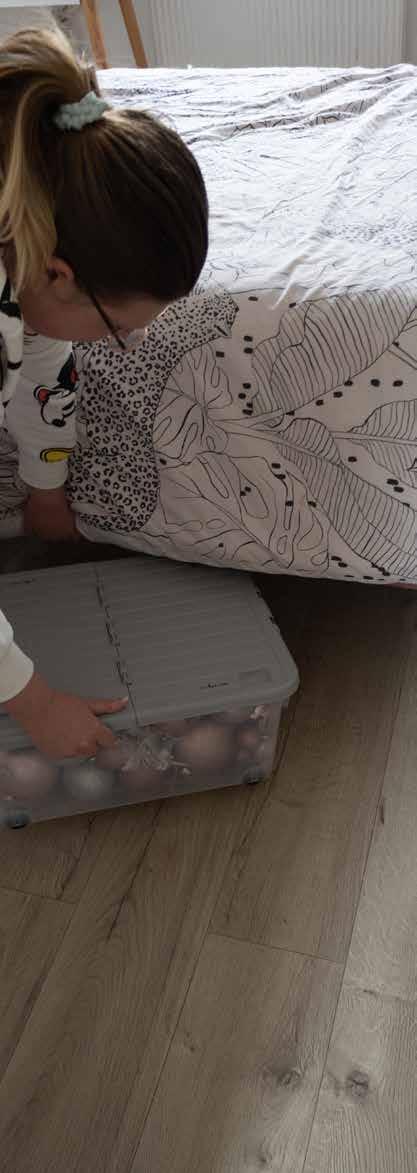
There are lots of clever ways to make the most of a small space. With some smart storage, you can create a stylish home free from clutter and full of the things you love.
Be flexible
Think about how you might use one space in lots of different ways. For example, can you use a table as a desk for work during the day, a craft and homework place after school, then for dinner in the evening?
It’s a good idea to have storage boxes close to a multi-use space so you can tidy things away quickly. It will also keep the things that matter together in one place, so you’re less likely to lose them.
Keep things neat
Storage can be stylish. Think about your furniture – maybe an ottoman could hold toys and double-up as a coffee table?
You can also reduce clutter by putting away things you want to keep but don’t need to use right now. Storing winter coats in an underbed box is a good idea for saving space in the summer months. Remember to label the boxes and bags so you can find things easily.
Declutter often
Try not to keep hold of things you don’t want or need. Reducing what you have creates more room, and you can make some money by selling it. List it on Facebook Marketplace or eBay or sell your old clothes on Vinted. Some charity shops will also come and collect items free of charge.
A ‘goodbye’ box is a good way to work out what matters to you and what you can do without. Put something in it and, if you don’t get it out within a month, give it away. That way, you’ll fill your home with things you use and things that mean something special.

What do bikes, furniture, clothes, hoovers, toys, ironing boards, books, and paint have in common?
They are all items which you can often get free or a low cost if they are preloved.
Why buy pre-loved items?
Second hand items are often as good as new. They are usually cheaper, so you can stretch your budget further.
By shopping second hand, you might find items you might not have been able to afford new.
Where to find pre-loved items
Lots of areas have Facebook groups where people give away items for free. They might be called ‘freecycle’, ‘before the tip’, or ‘recycle networks’.
Some local recycling centres have shops that are full of things that people have donated or that they were about to throw away.


Charity shops are also a great place to find affordable pre-loved items.
The staff at charity shops and local recycling centres sort and clean good items, so it’s always worth a visit.
Some areas have paint shops which sell hardly used or spare full paint tins for a fraction of the price they are usually sold for.
Things to remember
It can be tempting to accept anything because it is free. But, you don’t want to end up with something that you don’t need and that you have to get rid of. Deciding what you need and only looking for this will help.
Check if it’s enough. Sometimes people offer things because they want to help, but it might not be enough. Accepting nice paint or wallpaper might end up costing a lot if you need to buy more.
Check that any pre-loved furniture that has fabric on it, such as sofas or dining chairs that aren’t wooden, have fire safety tags attached to keep your home safe.

You’ve just moved into your new place, so it’s natural to feel excited about starting decorating. And it’s easier than you think to put your own style stamp on your home while sticking to a tight budget.
Give it a lick of paint
Picking up a paintbrush is a rewarding way to put personality into your new place. And painting’s a job you can do yourself with help from friends, family, and older kids.
You can buy second-hand paint that’s hardly been used. Look for something that says it has good coverage so you’ll only need to paint the surface once and have plenty left over. Make a big statement on a small budget and paint one wall in a bold colour for a stylish feature.
Shop local
You don’t need to visit fancy shops and spend lots of money – it’s surprising what people give away. Charity shops are great places to start. They’re treasure troves for decor, essentials (like cutlery and crockery), and even furniture. British Heart Foundation,

YMCA, and Emmaus all have goodquality pieces at reasonable prices. Facebook Marketplace is full of people selling things cheaply or even giving them away for free. High street homeware is also really popular. Pop into somewhere like B&M, Wilko, or Home Bargains and you’ll find loads of things that look expensive but don’t cost much.
Make it yours
There are no rules for decorating your home. Find your style, upcycle what you have, or even make things yourself. (Social media is full of ideas.)
There’s no rush. Add a throw to your sofa, frame some photos, or light a scented candle for a quick, low-cost personal touch. Then, shop around, decide carefully, and soon you’ll have a home that feels like yours – on your budget.


You can really change how your place feels by putting up some art. And there are plenty of options for finding and making great pieces of art on a tight budget.
Let’s start with frames
Charity shops often have frames in them. They are usually cheaper, and a bit nicer, than even the cheapest brand new frames. Keeping a list on your phone of what sizes you need will make sure you don’t come home with too many.
Prints can come from anywhere
Magazines, sample sheets of wallpaper, old fabrics from clothes or bedding that you still like the pattern of. Anything can be put in a frame. It often looks better than prints you might pay for.
Photographs of people (and animals) you care about
‘My daughter loves our dog. So we took and printed some photos of the dog
and have them in her bedroom. She loves them more than any prints we could buy from a shop.’
Filling your home with photos of people you care about is a great way to make it your own.
Big supermarkets and shops in your local town centre will often offer photo printing. They are usually low cost and they usually have a system so you can print them from your phone.
Photos you have taken
You don’t just have to print photos of people. Taking the time to get some nice photos in your local area can help you see your community in a new light. You can then get your favourite photos printed from the phone you took them with.
Showing off to your friends that you took the photo is optional!
Hanging photographs
Not just frames, you can hang photographs from a piece of string using pegs.

Dried flowers can be stuck on paper and put in frames, or even turned into cards.
1. Get some flowers from a spot where you are allowed to take them. Don’t take too many or damage other flowers
2. Open a heavy book and line it with newspaper. Place your flowers as flat as you can on the page
3. Carefully close the book and put weight on top of it
4. Leave them in a warm, dry place, and check on them daily
5. Once dry, carefully remove them
6. Use glue to put them on card and frame
Canvas refresh
Digital tools
Free digital tools are a great way to create your own prints. They often have templates
1. Download a free design app like Canva or Adobe Express
2. Decide the size that you would like your print to be and make sure your design matches
3. Design your own print on the app, using a template if you would like


Canvasses can be expensive. Especially big ones. This idea will help you create your own canvasses.
1. Find a low cost blank canvas or a pre-loved canvas
2. If pre-loved, get some canvas primer and paint over the canvas
3. Get some paints that you like the colour of
4. Find some inspiration on the internet for different patterns or styles
4. Print low cost at the local library or at a place that prints photo (supermarkets or shops)
Get everyone involved
If you have children, getting them involved in creating art that you can put up is a fun family activity and can help them feel at home.
Art is an adult activity too. Why not get some friends on board and create art for your homes together?
‘Rushing is the most expensive mistake’ says one of our interviewees. They go on to list, and laugh, at the things that they regret buying. ‘Were we ever going to be dining table people?’.
Good news: they repurposed the dining table into a homework, admin, and craft table. But it only took it’s role when moved to the living room.
Being excited to learn about how you use your space will reduce the pressure you put on yourself to have it all sorted.
Still taking it slow, waiting until you know what you need to store and where means your storage choices will make your life easier. If you’re changing baby in the living room, then why not store the baby changing stuff there? Moving the tin opener from the cutlery to be with the tins. Game. Changer.
Storing upwards will free up floor space.
You can find affordable organisation options in stores like Home Bargains, B&M Bargains, and IKEA. Waiting until you know what needs organising will make sure every penny is spent well.
Get the kids involved
Coat racks up high means the kids will never put their coat away. If they use something and it’s not going to harm them, put it at their height. Making it easy for everyone to help out will help you reclaim your time.

Find your sun traps. If there is a spot that gets the sun, plonk down a cushion and soak up the sun.
Finally,
How you use your space is important, not how much space you have. Filling those small spaces with only what you really need will take the pressure off and allow your money to go on other things. Takeaway (on the sofa) anyone?

Your home is your space. Whatever you think a home should have and be like doesn’t matter as much as making a space that works for you.
Disabled activists explain that people are disabled by barriers in society, not by their impairment or difference. This means that if life was set up in a way that was accessible for disabled people, they would not be excluded or restricted.
Applying this thinking to creating a good home means that your home should not disable you.
Trying to cover every impairment here would result in doing nobody justice, but we hope these ideas from disabled people give you some ideas.
Advice from local people
‘We are a family of almost all autistic people. The light bulbs really matter for my family and we agree on the right ones together. Plain and neutral colours have helped me personally.’
‘I have ADHD. I know what to do, but I struggle to do it. I make everything as easy as possible. I have what I need to clean each room in every room.’
‘All my clothes piled up when I was in crisis. I went to the launderette and had a fresh start. The staff helped me make it cheaper by washing colours separately but drying together. Best money I’ve ever spent.’
‘Making sure our house was adapted was a fight but it was life changing. Don’t give up and seek help, advocacy, and complain if you need too. You deserve a house that doesn’t disable you.’
‘Getting a silver handle outside the front door instead of a plastic hospital white one made it feel more like a home. Everything outside is plastic but the outside was enough.’
‘I have chronic pain. Electric blinds were the best thing that I bought. My bad days are no longer so dark.’

This part is for everyone. Whether you just want an outdoor space that requires minimum effort for maximum enjoyment, or you think a flat means no plants, or you really want to get into gardening – this part has something for us all.
Studies keep showing the benefits that greening has on your mental health.
Planting up your place is both something to do and décor. And green can really bring your place to life.
So, in this part, we focus on greening. It’s easier than you might think.

A tiny bit of knowledge goes a long way
A few small steps and simple skills can transform your space.
There are lots of easy options for greening your home - the next few pages will give you some ideas to get you started.
It’s good for you
Lots of studies have shown just how good gardening and green space is for your body and you mind.
You’re in a new place, with new responsibilities, and probably a lot going on. Just being in greener spaces can reduce your stress levels.
It can teach us a lot about ourselves Plants need the right environment and care to thrive.
You can probably say the same for yourself.
Spending time making sure even one plant has what it needs can be a reminder to give yourself the same care too.
Green brings peace amongst busy life
Whether you are going through a difficult time or live in a busy city, having somewhere green and calm to relax and unwind can give bring the peace that we all sometimes need.
Spaces to be proud of Being able to have people in your garden on a warm day, or showing off your houseplants inside, is a real motivator to get greening.
It’s good for the planet and future generations We all want to pass on a healthy planet to our children. Greening is an easy way to do our bit for making the planet healthier.
Think of the difference that growing food yourself instead of buying it after it’s been flown around the world might have. And gardens can absorb pollution as well as provide homes for birds, bees, and butterflies.



Growing your own food is cheaper than buying it. It is fun and eating the food that you have grown is really satisfying. You can grow fruits, herbs, and vegetables.

You don’t need fancy tools Pots, soil, and seeds are all you need. In some cases, you can plant foods whole or when you would normally bin them.
For potatoes, you can plant them whole.
Cover one in soil in the bag they came in and keep adding soil as green shoots grow. Water them well, and one potato can turn into lots more in just 10-20 weeks.
Old onions that have sprouted green shoots are perfect for growing your own. Plant them in March or April,
water them well, and they will be ready for June or July.
Start with what you already eat
When you’re on budget, starting with what you already eat will help save on food costs and keep you motivated to look after your food.
Get the kids involved
Growing food together is a great way to entertain the kids and teach them about looking after things.
Have a look at how to grow their favourite fruits and vegetables and start with the easiest.
I don’t have a garden
You don’t need a garden to grow food. There is a lot you can do from just a windowsill.
Herbs are a good place to start if you are short on space.
Basil, chives, parsley, and sage will grow happily in a pot by the window.
You can either buy herb seeds or potted herb plants. Herb seeds are usually available at discount stores and plants at supermarkets.

Greening
doesn’t just mean your
garden or outdoor space. Greening is possible inside, on balconies, and in shared spaces.
Houseplants
Bringing green indoors gives you the benefits of being in green space whilst also decorating your home.
A cactus is an easy to maintain houseplant because they are a desert plants. So, they are used to lots of heat, lights, and very little water. A small drink when their soil is fully dry is plenty. They are low cost too!
Succulents are also easy to maintain. They come in different colours, sizes, and textures, so they have real potential to decorate your space.
If you want to go to the next level, go for foliage plants (leafy plants). But, remember they need plenty of water. Bargain stores, supermarkets, and IKEA are good places to find affordable houseplants.
Balconies
Thinking of your balcony as a garden in the sky will help you get the most out of your balcony space.
The advice on the next page applies to balconies, remembering the challenge of wind and lack of rain.
Geraniums are flowers that are as hard as nails and easy to grow. Grasses allow wind to pass through them without causing damage. Succulents do well in harsh conditions.
From seed hauls at Wilko to tours of his Manchester balcony, @ CloudGardenerUK on YouTube is a great source of inspiration.
Ginnels (or alleyways) (or alleys)
Whatever you call them, ginnels are a shared space that can easily become dumping grounds.
Reclaiming this space won’t just make the space nicer - it will bring your neighbours together.
Have a look at the work of Groundwork, who have a step by step guide on greening your ginnel (or alleyway) (or alley).
*All information adapted from the Royal Horticultural Society website.

Your garden might have limited space. But your ideas don’t have to be small.
What do you want?
You might want to grow fruit and veg, have colourful plants, or have nice places to relax. Or you might want it all.
Being decisive about what you want from your small space will help you stay focused on making it work for you.
Plan it
Planning is how will you squeeze the most out of your small space. Measuring up and having a note of sizes on your phone will stop you getting anything too big.
No need to panic –drawing something that is roughly the shape of your garden and writing what you want to go where is absolutely a plan.
Choosing to make space in the garden for what you need is looking after yourself.
If things get on top of you, you could choose somewhere to put a cushion down to sit after a difficult day. If you can get lonely, getting two chairs for catch ups with the people you care about gives you the space to stay connected.
No grass? No problem
A grass lawn takes a lot of maintenance. Having no lawn gives you freedom to spend more time on things other than mowing and watering.
Keep it tidy
Getting rid of weeds, fallen leaves, and any other bits of rubbish is a quick way to improve an outdoor space.
Make space for you


An outdoor brush is a handy tool for keeping a space looking clear. You might be able to find one second hand. Or making friends with a kind neighbour might mean you can borrow one when your outdoor space needs a quick sweep.
Who is your garden for?
Figuring out who your garden is for is a good start. Is it for adults, children, pets, or everyone?
It could be for you and your friends. You could decide that you want it to be for wildlife. You might decide you want a bit of both.
Decide what you want You might want space to eat outside, space to grow lots of flowers, or something that just looks nice and doesn’t need much looking after.
Get to know your garden
The one thing that you can’t control is where the sun hits and at what time.

If you like the sun, design your garden around this. You might put a chair in a sunny morning spot for a brew or something comfier for a weekend afternoon nap in the sun.
Take the time to get to know your garden. It will take a year to really get to know it because so much will change during different seasons.
Think of your view
Where can you see your garden from? What can you see?
Make it work for you
Your garden should be a place to unwind. If you have a busy life, you don’t need your garden making it harder.

When creating a garden that looks beautiful from the back door, it is easy to forget the view from any windows. A nice view from any windows inside your home will change the feel of your place.
Avoiding growing fruit and veg, having lots of pots, and hanging baskets will save you time on maintenance. Flowers, shrubs, and trees planted in the ground rarely, if ever, need watering.


It also means learning how to live with someone. It can take work to really get it right.
We know that it’s the people who make a home.
So, in this part, we focus on people.
We give advice to help make a you’re creating a happy home for those you live with and yourself, as well as sharing ideas for food and shopping.
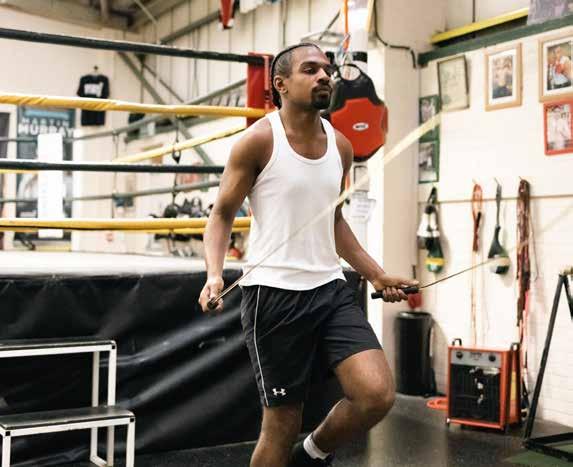
Living alone for the first time can be daunting. It’s normal to feel nervous. For many people, living alone brings a lot of peace.
Find yourself
Living alone is a time where you can really get to know yourself.
It could start as little as cutting out TV shows and meals that you didn’t like. It might go onto figuring out what really matters to you.
Figuring yourself out can take a lifetime. Writing can help. Your notes app can help to get thoughts out of your head when there’s no one around to vent to.
Connect with others
Living alone is different from feeling alone. People who live with others get lonely too.
Part of finding yourself is about finding out who matters to you, how often you need other people, and when you need them.
Making the space in your home for connecting with the people you care about and keeping it clean enough for you to say no to visitors because it’s a mess (we’ve all been there) will make sure you don’t accidentally isolate yourself.
Look after number one
Having your first place alone is a special type of freedom.
Sometimes with that freedom, we stay up all night, don’t eat proper meals, don’t get ready, and don’t shower. No judgment here – sometimes a pyjama do nothing day is absolutely needed.
Other times, though, it’s because we you might not be feeling good enough about yourself to look after yourself.
Breaking the cycle gently can make it easier. Starting with one good meal a day or changing from pyjamas into just different pyjamas might make the world of difference.
You deserve to be looked after. Even by yourself.

Living with your partner can be a big step. You both deserve to live in a home where you are safe, happy, and loved. Living with the people you love can bring immense joy, so getting it right is really worth it.
A big decision
The housing crisis has pushed up the cost of renting and buying a home, so you might be rushed into moving in together.
Holding off because it isn’t the right time isn’t an easy decision, but it shows that you are both serious about making your relationship work.
Talk through the big stuff
From budgets to cleanliness to visitorstalk as much through as possible before you move in together. It is important to maintain your boundaries. But remember that living together is all about compromise.
Agreeing what you both think is fair and doing what you have promised
shows your respect for your partner and can make you both stronger.
We all have our little things
When moving in with someone new, you can easily be irritated by the little things that don’t really have an impact on you.
Remembering that you have them too might help stop arguments over things that don’t really matter.
But some things do have an impact on you, so always talk them through.
Decorate it together
Your home is not just yours now - you might have to compromise about decoration. But you can use it as a challenge to be creative to find what works.
Enjoy it
Couples who are waiting for their first place together will tell you how exciting the idea of doing a food shop together is.
Whether it’s laughing off a burnt meal or having to tidy at 100 miles per hour for an unexpected visitor – try to find joy in the small things.

Being a parent can be so rewarding. But, it can also be draining. Especially when you’re juggling lots of things.
Nobody is a super-parent Mums and Dads put extra pressure on themselves. Be kind to yourself and accept that you might not get everything perfect all the time.
Show affection
Whether it’s a hug, a kiss or a wink; all forms of affection can help children feel cared for, loved, and build their confidence. Spending time together and doing different activities like reading and playing will help you form a healthy relationship.
Keep talking and listening
When you’re tired or juggling different things, it can feel hard. But, keeping talking and
listening to your child will help build trust between you and help develop their speech and language skills. Be available
Making time for your child means that they will come to you when they feel something is wrong or they are upset.
Dealing with bad behaviour
Stop. Breathe. React calmly.
Setting clear rules will help your child know what good behaviour is and reasonable consequences help them learn not to do something again. Explaining your actions will help them understand consequences. Using a calm voice will make your child more likely to listen to you.
Praising children whenever possible helps build their confidence and their understanding of what is good behaviour.
Find time for yourself
Try to find time for yourself every week to let yourself unwind or do something that you enjoy. It’s easier to take care of your child if you take care of yourself too.

Where to find out more
Websites: NSPCC and BBC Bitesize Parent’s Toolkit
Instagram: @ bbctinyhappypeople and @nspcc_official
Apps: Vroom is a free app that gives ideas about learning in everyday moments
*All information adapted from the NSPCC.

Holly moved out of her family home at 18 and has shared flats with other people for the 6 years since.
What is your number one piece of advice for someone flat sharing? Definitely set your boundaries.
Obviously, it depends if you find a place together or just move in with someone but be clear about your budget, location, which bills you split, visitors, and partners.
Think about what you want for your life and find someone who roughly matches. Basically, ask yourself if you can imagine sitting chilling with that person.

gossip and a moan and it’s great. Once, the microwave exploded. Sounds bad but it was just so funny.
I think also if your home was chaotic growing up, it can bring you some real peace.
You know what, as well, because we are splitting the rent then I am living in a nicer place than I could afford on my own. That’s a perk too.
“Think about what you want for your life and find someone who roughly matches.”
What do you enjoy about flat sharing?
Just the joy of living with someone. Going through the ups and downs of life together is special. You also get their support network - thanks to my flatmate’s Uncle for all the repairs. I will look back on this time really fondly. Some Friday nights we have a
How can you prevent arguments?
As well as being clear about things, try to relax. Borrow things off each other if you run short and share the cleaning. Just don’t take the mick really.
Speaking about cleaning standards as well is important. One of you will have to raise your standards so just be ready for that.
Anything else?
Make sure your shared spaces feel like home too, candles or blankets make our living room cosy.
Also, make time for yourself.


One of the best parts of having your own place is being able to share it with the people that you care about.
Only invite people you trust
Going back to our interview with the housing options advisor on pages 9-10, you might remember that you are responsible for the behaviour of your visitors.
Starting by only inviting people that you personally know and can trust will save yourself a lot of hassle.
If anyone shows that they can’t be trusted in your home, don’t feel bad for setting your boundaries by asking them to leave.
If you want to do more, you can still keep it low cost. You might make an extra portion of a meal that you usually have anyway.
Parties and anything bigger can easily add up. Decide what you want to offer people and what you want your guests bring when you invite them. Most people are happy to oblige.
Be a good guest and your guests will be good back
“If you want to do more, you can still keep it low cost. You might make an extra portion of a meal that you usually have anyway.”
Everyone makes mistakes, so trust your gut about whether or not to invite them again.
It doesn’t have to cost the earth
Having a mate round for a brew is a cheap way to stay connected with others.
Simple gestures when you’re visiting a friend’s can go a long way.
It doesn’t have to be expensive – a bottle of lemonade or fresh milk to go in your brew will show them that you appreciate being invited round.
In fact, it doesn’t have to cost at all. Offering to wash the dishes you have used goes a long way too.
Copying is how we learn. So, set a trend amongst your friends to be a good guest and the favours will be returned in no time.

If these ideas aren’t exciting you, a quick search online will bring up so many ideas for easy, affordable options.
Just-open-the-packet level easy
• Pack of grapes or strawberries
• Crisps
• Tortilla chips and salsa or hummus
• Water
Still pretty simple
• A brew
• A sandwich
• Garlic bread
• Toast
• Soup and bread
• Chips from the chippy
Easy meals
• Jacket potato
• Meatballs and pasta
• Fajitas
• Omelette
• Flatbreads with chicken or halloumi
• Stir fry
• Pizza calzone (recipe on page 86)


Figuring out a few meals that you like and are easy to make is a big part of settling into your first home.
How to plan
Checking what you already have in will save money. Planning meals around the same meat and vegetables means you will get the most out of your budget. Fewer people? No problem – follow family recipes but save extra portions to have on another day.
Some ideas that serve 4 people
• 2 chicken breasts or 2 blocks of halloumi
• 4 tortilla wraps
• Lettuce leaves
• Cherry tomatoes
• Tzatziki
• Garlic
• 2 teaspoon oregano
• Drizzle of oil
Greek style wrap
1. Cup up the chicken into cubes and mix them in oregano and oil
2. Grill until edges are well done
3. Lay out your wraps and line with some tzatziki, lettuce leaves, and tomatoes
4. Add the chicken to your wrap
5. If you want a real Greek gyros, add some chips into your wrap
Sausage and beans (great for leftovers)
• 6 sausages
• 400g tin beans
• 400g tin chopped tomatoes
• Tomato puree
• 1 tsp mixed herbs
• 1 stock cube
• 1 tbsp oil
1. Heat the oil in a big saucepan and add the onion
2. Add the sausages and cook for 8-10 minutes until they brown
3. Drain the bean juice away then pour the beans over and add the tomatoes and tomato puree
4. Add in the herbs and crumble in the stock cube, stir it well so it mixes in
5. Turn the heat up high for five minutes, then reduce to a simmer for 15 or until the sausages are cooked through
For more ideas
TikTok and Instagram are full of cheap meal ideas.
Supermarket websites and sites aimed at students have ideas too.

A new place is a chance to figure out who you are and what you enjoy. When you know, make space for that in your home.
Our survey pulled out lots of ideas that you might enjoy.
… and, relax
Relaxing means different things for different people. Listening to music, watching YouTube, being creative, playing video games, or even calling a friend. A relaxing friend, mind.
Getting out and about
‘If I’m bored I get up and walk. If I just stay bored or like sit on my phone then I am bored in the day and don’t sleep at night. Walking tires me out and clears my head.’
‘Bike rides. My bike got nicked and I felt proper lost. Walked past a charity shop, seen one and was like a zombie compelled to go to buy it. Proper clears my head.’
Sports
‘Boxing is what I do. I can forget about everything in the
gym and just focus on my training. Don’t get me wrong, I’m working hard, but I feel mentally better afterwards.’
‘I do free pilates videos on YouTube. Not too hard or boring but it’s exercise isn’t it?’
Magazines and books
‘I have this app from the library that has magazines on it. I chill on the sofa and flick through a magazine on my phone. Whatever magazine you can think of, they probably have it. Fashion, celebrity gossip, ones about homes … I can get through so many in one night.’

‘I feel like if you don’t like reading then you just haven’t found the right books. I like people’s life stories and books that make me laugh, but some of my mates are into horror. There is so much choice of books. If you get them from the library, it’s free.’

Arranging a playdate is a great way for you and your children to make new friends and get to know people in your area.
Invite a friend
Ask your child who they’d like to have round to play. Then, talk to their parents or carers in the playground or give them a note with your number on. If you’re inviting them for tea, don’t forget to ask about allergies or special diets so the child feels safe, happy and welcome.
know people and make friends. But never expect them to invite you back to their house. It might not be possible – remember, everyone’s situation is different.
Of course, you can invite family members as well as friends – it’s still just as fun for the children. Plus, you’ll have some company and build your confidence in hosting new people in your home.

Approaching new people might seem strange. But parenting is tough and most people will appreciate the offer of a playdate, and be happy to accept.
Include the parents or carers
Inviting the parents or carers to stay for a brew is a great way to get to
Enjoy the noise
Children are loud and there will be a lot of mess! But it’s all part of the fun, so make the most of it.
Why not make your own pizzas for tea, getting the children involved with an easy meal with low-cost ingredients?
A busy and exciting playdate is also tiring for children. So, when their friends have gone, they can have an early night. And you can put your feet up!


No matter what social media says, you don’t need to go out and spend a lot of money to enjoy quality time with your children.
Spend time at home
There are loads of fun activities you can do cheaply, or even for free, in your own home. Try painting and drawing, cooking and baking, or playing pretend with younger children and their toys.
For older children, offer to join in with video games or pick up a board game from your local charity shop for a family-friendly competition!
Get outdoors
It doesn’t matter if you don’t have a garden. Your local park is a great place to get some fresh air and run around, or splash in puddles if it’s raining! Go for
a bike ride, visit the skatepark or bring a football for a kickabout with friends. Or, if you live by the sea, make the most of the chance to pop down for a day at the beach.
The National Trust has a list of ‘50 things to do before you’re 11 and ¾’, with outdoor activity ideas that you can do all year round.
Find a free day out
Most towns and cities offer plenty of things to do for free. Take a look at what’s on at your local museums and galleries, join in with activities at your local library, or see what community events are happening near you.
There are lots of things you can do cheaply, too. Many places, like soft play centres, cinemas or swimming pools, have discounts and offers. Plus, stopping by the ice cream or chip shop is always a treat for children – and adults!


When money is tight, food shopping is about getting the most out of your budget. Some simple food shopping habits can help reduce costs.
Plan your meals and write a list Supermarkets are designed to make you spend more money. Deciding what you need and sticking to it will help get the most out of your budget.
Frozen items can be cheaper
Frozen fruits and vegetables can be cheaper than buying them fresh. They taste just as good and are often already sliced for you. That’s more fruit and veg for your money.
Tins can be cheaper too
Tinned vegetables are a great way to cut costs and ensure you are getting the vitamins and fibre that you and your family need to stay well.
Explore the world foods aisle or local From tins to spices to garlic puree, the world foods aisle can have items that you are already buying but cheaper. Feed toddlers the same as you Making sure not to add spice or seasoning to your little one’s portion, chopping up what you are eating will help reduce costs. You can freeze child sized portions for later too.
Try some vegetarian options
Meat can be expensive. Beans and lentils can fill up a chilli or Bolognese for a fraction of the cost of mince. Mixing it up every now and again can cut costs.
Don’t struggle alone
Everyone should be able to have a good meal.
When money is tight, unexpected costs can easily take over, so don’t be embarrassed if you need help.
Don’t struggle alone - find a local foodbank or see if your local council has support.
Cooking with children is fun, you can help them develop their skills, and before you know it they might be making your meals.
Getting as much learning in as possible Counting ingredients together can help with maths. Letting them pour and stir will help their co-ordination. Teach them about kitchen safety as you go.

4. Mix the tomatoes with the grilled vegetables and keep warm
Get them involved in every step from choosing what to make and clearing up too.
Pizza Calzone
You will need:
• 4 tortilla wraps
• 4 tomatoes
• 3 tsp mixed Italian herbs
• 80g grated cheese
• 1 pepper thinly sliced
• 150g sliced mushrooms
• Salad leaves
How to
1. Preheat the grill
2. Arrange the peppers and mushrooms on a baking sheet and grill for 4 – 5 minutes
3. Chop the tomatoes and mix in the herbs
5. Put a tortilla into a frying pan and sprinkle cheese on the top. Cook over a medium heat for about 30 – 40 seconds until the cheese has melted
6. Add the vegetable mixture to one side of the tortilla, then fold it in half over the filling
7. Cook for a few moments then serve warm with salad leaves
8. Repeat with the remaining tortillas
Swaps:
You can replace the toppings with any fresh, frozen, or tinned veg. For a snack, just make two.
More ideas?
I Can Cook on CBeebies has lots of ideas for cooking with children.
You might also find a children’s recipe book at your local library or a digital version on the libraries app.

In your first place, you will figure a lot of stuff out. About yourself, about whoever you might live with, about dealing with a whole home. It really is a lot.
So, in this section, we focus on keeping on top of it.
We didn’t speak to anyone who has truly figured it all out yet. If they had, they could probably write a series of magazines.
Here you will find some great advice about cleaning and bills.
If you do figure it all out, we would love to read your magazine(s).


Everyone deserves to live in a clean space. But keeping on top of it all isn’t easy. A few days go by and you’re wondering how you make so much mess.
Cleaning as you go
From washing up straight after dinner, to smartening up the room you’ve just been chilling in, to putting your washing away as soon as it’s dry. Do these often enough and they will become a habit. They’re not as time consuming as they first feel, promise!
Living with others
Clean, tidy, and organised means something different to everyone. Finding out how the people you live with want the home to be and working together to reach that will keep everyone happy.
Clear out the clutter
By buying only what you need, you will have less to clear out. But there will be a time when some things just need to go.
Repairing broken items is often easier than it seems. Getting creative and upcycling items can save you money too. Finding new homes for items in good condition will make it easier to let go.
The staff at your local recycling centre will help you recycle as much as possible.
Beware if paying someone to clear your waste. Your waste is your responsibility. If they fly tip it, you could be fined. Following the SCRAP code will make sure your waste is removed correctly. Scan the QR code to read about it.
Make it (a little bit) fun
Why not turn up your favourite playlist, a podcast, YouTube, whilst getting your home in order?
Scan Me

Setting a timer makes it less daunting and you’ll see just how much you can get done.
Rewards help too. Cookie dough ice cream. On the sofa. In your cosy living room. In your sorted-out-home. Delicious.
General tips
Never scrub or rub a stain. Dab carefully with a white cloth. No white cloth? No problem. A piece of white bread works too.
It is always better to deal with a stain as soon as possible.
Brightening clothes
You don’t need a fancy products to make your clothes bright again. A cheap white vinegar from your local shop works brilliantly.
Soak your clothes in a white vinegar and water mix before washing or add a little with your laundry detergent. Don’t worry – the smell goes.
Oil or oil based products
If the stain has been caused by an oil based product, sprinkle salt on the stain and leave it for a bit. The salt should absorb the oil.
Grass stains

Use an old toothbrush and toothpaste to scrub away the stain. Make sure it is paste and not a gel.
Coffee

Sweat stains
Try to dab as much of it away with cold water as possible. Rub washing up liquid into the stain and leave it for 5 minutes. Then, wash as usual.
Blood stain
Soak the stain in a white vinegar and water mix then dab away any blood.
If the standard wash isn’t working, plain shampoo or washing up liquid might work. Apply to the stain, rub it in, and leave it for a bit. Then rinse it out and try washing it again.
Tea stains
Rinse the stain with cold water. Then, rub in washing up liquid to the stain. Let it soak for five minutes. Then soak your item in cold water. Finally, rinse the stain.
Anything else?
Google it. Lots of ideas will come up.
Bills and budgets. They don’t even sound exciting. But they’re necessary. Get them right and it’s a big stress off your shoulders.
Work out your monthly budget
The act of figuring out a monthly budget, before you have even followed it, can help because it gives you a feeling of control.
Scan the QR code to get to Citizens Advice’s digital tool that helps you make a budget.
‘Budgets sound strict but mine gave me freedom. I know that I can afford something nice in the food shop. Without my budget, I just felt guilty all the time.’
Sort out your direct debits
In our survey, lots of people suggested changing your direct debits to a couple of days after you get normally get paid.
‘Sometimes I’d think I had money and the next day it had gone on a bill that I had forgot about.
They all are on the same day now and I know what I have left to spend.’
Find what support you are entitled to If you are on a low income, you might be paying for things that you can get for free.
Turn2us, Money Saving Expert, and Citizens Advice are good places to start in finding what support is out there.
Check your local council website and local charities too for any more local support options.
Find your spending triggers
If you think that you are spending too much, look for your triggers.
Sometimes we spend because we feel low, sometimes because we feel lonely, and sometimes because we are bored. When you know the trigger, you can find the alternative.

Debt can make you ill, affect your relationships, and affect your mental health. Don’t struggle with debt alone. Find debt advice through your local council or a local charity.


It takes a City to make a magazine. This wouldn’t be here without so many people. We want to thank:
Everyone who responded to our survey
Jane Anderson, Housing Options, Salford City Council
Sharon Wallace – ForHousing
Phil – ACORN Manchester
Jill, Bill, Ann, Pat, Toni, and Damo – Birch Road Estate Residents
Catherine Connors - Welfare Rights, Salford City Council
Paul Bland, Richard Waters, and Alex Culshaw – Worsley Leisure Centre, Salford Community Leisure
Michelle Healey and Karen – Walkden Library, Salford Community Leisure
Aaron Pearson, Asa Keenan, Steve Gordon, and Poppy – Salford Community Leisure
Clouds in Walkden
Mrs A’s in Eccles
Tom Togher, Citizen’s Advice Salford
Dave Timperley and Mat Ainsworth –Work & Skills, Salford City Council
Ryan – Newsham Heating
Our decorator who wished to remain anonymous
Joan Fielder and Jerry Lawes - Helping Hands
GMP’s Burglary and Robbery Sergeant
Our counsellor who wished to remain anonymous
Guy Barter – RHS Bridgewater
Kieron McGlasson – Sow the City
Residents of Westwood Park Estate
Stuart Moss and the Buile Hill Park Hall team, Citywide












Co-designed with:
Mat Ainsworth, Salford City Council
Debbie Blackburn, Salford City Council
Martyn Hague, ForHousing
Pete Openshaw, Salford City Council
Judd Skelton, Salford City Council & NHS Greater Manchester Integrated Care
Project delivered by: Unlimited Potential
Project funded by: Public Health, Salford City Council
Project facilitated by: Laura Edwards, Unlimited Potential
Photography: Sara Auty, SAZ MEDIA
Copywriting Support: Laura Barritt Copywriting
Design and Printing: NMC Design+Print, Winsford
Your Good Home is a magazine that aims for just that.
Because good homes are the foundations that everyone needs for a good life.
But, not everyone is growing up in or able to get a good home.
We’ve been there.
And we are trying to do something about it.
After we settled on Good Homes, we started with a vision. We want everyone to be able to say:
‘I am really proud of the home that my family and I have made, we like to share it with those we love the most. It’s special because it’s our safe space … it’s our home. We have decorated and filled it with happy memories and we can’t wait to create more memories here. We are a short walk from peace, green, and quiet. We don’t just feel welcome here, but we all come together as a community.’
With our vision, we brought decision makers who work within the system.
Together, we decided that we would create a magazine.
Creating a good home should be something that everyone feels able to do.
Be it practical advice, knowledge, or just some inspiration – we hope that our magazine gives you just want you need.